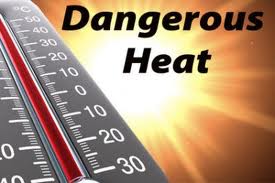Excessive heat expected today: Check on the elderly, friends, neighbors and pets
June 27th, 2012 by Ric Hanson
The big heat wave is expected today (Wednesday), all across the Midwest. Temperatures forecast to reach near 100-degrees, but the heat index — or, what it feels like when the humidity is factored in — will make it feel like 105-to 110-degrees. A Heat Advisory goes into effect today beginning at 1-p.m. The Advisory runs through 9-p.m. for the far west and southwest counties, and until 8-p.m. for the rest of the area. The heat wave is expected to continue into the weekend.
A Heat Advisory goes into effect today beginning at 1-p.m. The Advisory runs through 9-p.m. for the far west and southwest counties, and until 8-p.m. for the rest of the area. The heat wave is expected to continue into the weekend.
Officials with Cass County Home Care in Atlantic remind you that elderly relatives, friends and neighbors are at a higher risk for heat-related illnesses during these extreme conditions. According to the Centers for Disease Control and Prevention, heat stroke, the most serious heat-related illness, occurs when the body’s temperature rises rapidly, loses its ability to sweat and is unable to cool down. Body temperatures can rise to 106 degrees Fahrenheit in as little as 10 to 15 minutes. If left untreated, heat stroke may lead to permanent disability or even death. While less serious than heat stroke, heat exhaustion can also occur after several days of exposure to high temperatures and inadequate hydration.
Rhonda Duvall, registered nurse and clinical manager at Cass County Home Care, says “Older adults are especially at risk of heat stress because with age the body does not adjust as well to extreme changes in temperature. Chronic medical conditions and prescription medicines common to elderly patients also affect the body’s ability to regulate its temperature.” Important precautions include remaining inside in cool, air-conditioned areas, restricting strenuous activity, wearing lightweight clothing, and bathing in cool water. Staying hydrated is also critical during extreme heat; however, it is not uncommon for some elderly patients with certain medical conditions to be limited in the amount of fluids they can drink.
In such cases, a physician should be consulted before drinking more fluids than typically recommended. Older adults at risk, especially those living alone, should be visited twice a day by family, friends or care providers during periods of elevated heat and checked for signs of heat stress. Symptoms of heat-related illnesses include rapid pulse, shallow breathing, and lack of perspiration and body temperatures exceeding 103 degrees. If a person exhibits any of these signs and heat stress is suspected, dial 9-1-1 immediately. Also, remember to keep an eye on children and pets. Make sure pets have adequate shade and plenty of fresh, cold water if they must remain outside.





